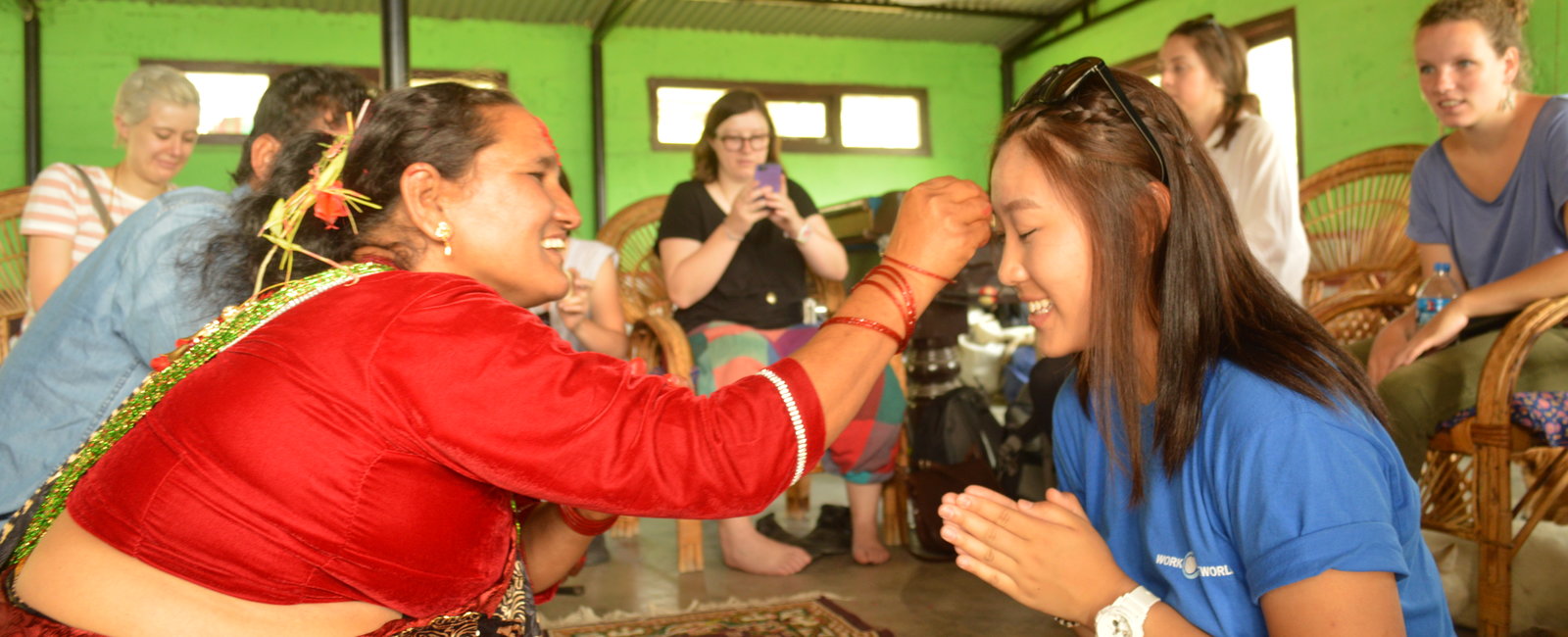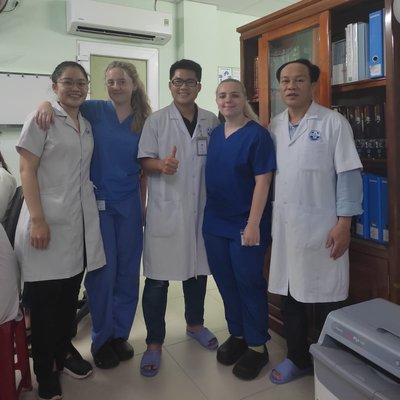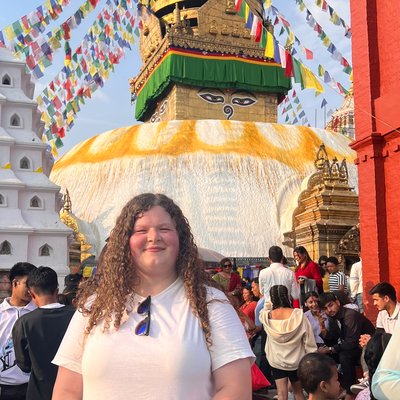University of Leeds 2017
When my friend Georgia and I arrived at Iloilo airport, we were met by Joy, the Assistant Programme Manager. She was one of the Work the World team whose job it was to look after us during our stay. Joy helped us with our bags and took us back to the Work the World house in a local taxi. It was around 9pm when we arrived, but we were so pleased to be there! Gerry, the chef, had laid out an evening meal for when we arrived.
After dinner, Joy helped us settle in. She showed us our room and which beds we’d be sleeping in, and gave us a tour of the house. The first evening was nice and laid back, and everyone was really welcoming. On Monday, once some other students had arrived, we went on our city orientation and hospital tour.
For the city orientation, we took a jeepney, which is the most common form of public transport in the Philippines (a type of minibus). The jeepneys were always very busy, but a quick and cheap way to get around. We then went to the hospital and were treated to a welcome ceremony, which included local staff singing the Philippines’ national anthem, and a flag raising. The ceremony lets the whole hospital know who you are — very different from the UK where you’d just have to get on with it and blend in!
We introduced ourselves to everyone, and we had a meeting with the Head of Hospital where we were told about the values of the medical centre. The values and mission of the hospital were very much the same as in the UK: deliver the most effective quality of care with the resources available. It was then I began to see a lot of similarities as well as differences between Filipino healthcare and the healthcare at home.
Next, we were shown to our department, complete with X-ray, CT, MRI, and mammography. However, the MRI and mammography were not used, as they didn’t have trained radiographers there due to funding. X-ray, CT, and ultrasound remained open, however. My first day was all about getting used to the departments, having a full induction and meeting others — everyone was really friendly and really nice, and so pleased to welcome us to Iloilo.
Iloilo is known as the ‘city of love’, and that’s very clear by how kind and friendly the locals are. Everyone I met went out of their way to make me feel welcome, and offered me food! I was surprised how developed the city was — I went to many other parts of the Philippines on my trip, but none were as developed as Iloilo. The area that the Work the World house is in is really lovely, but I did see a difference as I travelled around the area, in terms of wealth and amenities. A lot of people have very good quality of life in Iloilo. Plus, the contemporary mall had everything in you could need!
The Filipino staff understood that things are different between the Philippines and the UK, from confidentiality to infection control. They know they can’t always provide things to the standard they’d like. For me, it meant I could acknowledge why they work in a way that’s different to what I’m used to. I brought my own gloves and mask, as they didn’t always have enough, which meant I could share with others, too. The Filipino staff want to have the right equipment, they just don’t have the funding, so they have to prioritise which high-risk patients they can and should use their resources on.
The conditions patients suffered from were largely similar to the UK, but the severity differed greatly. Patients only seek treatment when their illnesses are at an advanced stages. This is because healthcare is relatively expensive and hard to access from many places. In some cases the severity would be a lot worse than in the UK. Patients’ conditions would also deteriorate a lot more rapidly due to poor infection control.
The way the Filipino staff did things was very different. Doctors took on many roles that they wouldn’t in the UK. In fact, I feel they took on more than they needed to. To highlight the differences, I’m about to start a masters degree in Medical Ultrasound, but sonographers don’t exist in the Philippines — doctors perform that role. Radiographers write the report and do the administrative processes as a support for the doctor. By contrast, in the UK radiographers are now taking on wider roles than ever before. Roles are more limited in the Philippines, and I don’t feel there’s the same career progression. There was more of a hierarchy than I was used to, but everyone respected their colleagues regardless of seniority, and were kind and supportive. The doctors were so welcoming and down to Earth, including Senior Consultants. In the UK, you can often see a bigger divide. In the Philippines everyone got along together, they’d all eat together at lunch and hang out, unlike in the UK.
The whole experience was a lot better than my expectations. There was a culture shock, but working alongside Filipino people, I quickly came to understand why things were the way they were. The number of patients and the state in which they came in were different, but staff did whatever they could with whatever they had — it’s truly commendable. In the UK, we have so much more, and we still complain. Filipino people don’t have nearly as much in the way of resources — even with the complex cases — but they still come in to work positive, happy and enthusiastic, willing to do whatever they can for their patients. The education and clinical knowledge are still at a high standard.
"Filipino people don’t have nearly as much in the way of resources — even with the complex cases — but they still come in to work positive, happy and enthusiastic, willing to do whatever they can for their patients. The education and clinical knowledge is still there to a high standard."
You might be tempted to point out things local staff are doing “wrong” but you need to take time to understand why things are done in certain ways. You need to go with an open mindset and not compare what you see to how it is at home. The country is different, the people are different, and as guests, we shouldn’t try to change that.
They staff certainly aren’t laissez-faire, they really try their hardest. I noticed with X-rays, because patients pay for them, the staff do everything within their control to make sure the X-ray is the best it can be — perfect, if possible. In UK, things seem more rushed, and X-rays are taken again, perhaps because there isn’t the pressure of the patient paying for it directly. The experience helped me appreciate what we have in the British healthcare system. It made me more efficient with resources.
It also helped me gain adaptability to a different environment. Communication, especially non-verbal communication, was a very big learning area for me, and I learnt to avoid using closed-off body language with patients. I learnt a lot of Hiligaynon, the local dialect, and we also had language lessons at the Work the World house two days a week. I knew the phrases I needed in the hospital, which made a huge difference to my experience as well as to my relationship with the patients.
In the afternoons after placement, we went to a local hotel with swimming pools, visited nice resorts, and chilled out with our housemates. Every Friday night, we had BBQ night, which was amazing, complete with karaoke, which was so much fun. On the weekends, we’d try to travel as much as possible. The first weekend we went to Antique, the second to Gigantes Island, and the third to Boracay — otherwise known as the party city. We stayed in Boracay for a full week (our placement had finished at that point) whilst organising our travel further to El Nido, which was voted one of the most beautiful islands in the world and a really stunning destination.
The best place was Boracay. It was touristy, but everywhere was air-conditioned! There were beaches, and it had a “holiday” vibe. We did loads of activities there too — scuba diving, parasailing and more. But El Nido was beautiful, with white beaches and very clear waters.
While in the house, we met students from a lot of different disciplines — pharmacists, nurses, midwives, medics, all of whom spent time in different departments, like the animal bites clinic, burns or OBG. After placement, we talked about our experiences meaning we could understand things outside the scope of our own practise.
I also met students from Philippines, including radiography students, who spend a whole year on placement. They’re known as ‘interns’ in the Philippines. We learnt from each other, and it was nice to understand their experiences and what they thought about our learning differences. The first few years of their practise is textbook only, so they often came to the hospital without practical experience.
My favourite memory was in CT, where the staff cooked loads of food one lunch break — we had a big feast! There was a really nice atmosphere, with all the staff getting involved. They even taught me to make sticky rice and fish curry. All the doctors came and we sat together, giving us a real sense of togetherness. That was one highlight of my hospital experience. Being in the Philippines, we also took loads of selfies and ate plenty of cake!
"If you’re considering a Work the World placement, my advice would be ‘definitely go!’ It’s the chance of a lifetime, and it will open your mind to different cultures and experiences. The programme in Iloilo is absolutely fantastic. It’s organised so well and every student there is happy and having the time of their life!"
I can’t fault the staff, Gerry the chef even tracked down halal meat for me, which took him over a week (halal is not a prominent diet in the Philippines), but he did it! Joy and Richard (the Assistant Programme Manager and the Programme Manager) are the mother and father of the house and truly care about the programme. Everyone is so thoughtful — the programme staff, the housekeepers, and the security — we always felt safe and looked after.
I didn’t get homesick, as I honestly felt totally at home while I was there. Even on the weekends away, I couldn’t wait to go back home to the WtW house! When we left, we were so upset, as we’d had such an amazing time. We met loads of friends, and I’ll never forget my time in the Philippines with Work the World!
Read more about our Electives in Asia, and you'll find options in Nepal and beyond.








